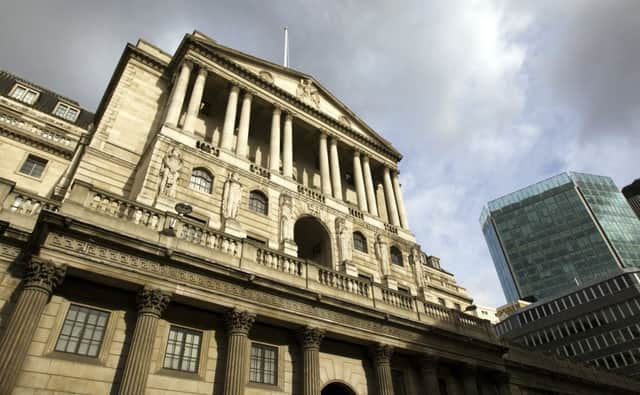Bill Jamieson: There are some hidden benefits to rising inflation


There are fears that the inflation rate will not stop at last month’s jump from 0.6 per cent to one per cent but will climb much further in the period ahead.
And then for investors there is the hit to the gilt-edged market – supposedly the safest haven for long term savers.
Advertisement
Hide AdAdvertisement
Hide AdLast week saw a sharp sell-off in government bonds, pushing gilt yields to their highest level since the referendum. Gilts tumbled 0.3 per cent during the week and 2.1 per cent over the past month. UK corporate bonds experienced similar falls.
At one point gilt yields breached 1.2 per cent, a level that hasn’t been seen since the June referendum and more than double the low reached in early August.
But amid all this, several more positive points have been lost from view. Chief among these is that the spectre of deflation has shrunk. In some countries yields on deposits had even gone negative, with central banks imposing a charge on deposits. While this was intended to encourage firms and high net worth individuals to spend the money and thus boost economic activity, the reverse proved more true. Fearing that prices might go lower, confidence failed to rally and the grim prospect ahead was of savers hiding cash around the house rather than seeing their nest egg eroded through negative rates of return.
Another benefit is that savers – at long last – could start to see a meaningful return on their fixed interest investments. That may not be much consolation if a higher inflation rate eats into real spending power. But the benefit of compound interest – the accumulation of re-invested income over the years - is a vital mechanism for lifting pension fund returns.
Note also that annuity rates, which have suffered a long-term slump as a result of falling rates, have risen 3.4 per cent in the space of four weeks. And then there is arguably the greatest if invisible benefit of all – the erosion of the real burden of debt.
In the inflation-soaked decade of the 70s, millions of mortgage borrowers benefitted from the shrinking weight of debt – the outstanding loan may not have changed, but the onus was much reduced as inflation brought higher household incomes which worked to shrink mortgage interest payments as a percentage of income.
Just as the threat of deflation terrified central bankers with the prospect of an ever higher burden on debt-burdened economies, inflation works in the opposite direction to reduce the pain of debt.
And here the UK could find itself a significant beneficiary. While the economy has shown notable resilience following June’s Brexit vote, figures on the public finances showed there has been no beneficial impact on the government’s borrowing and debt totals. Indeed, government borrowing jumped to £10.6 billion in September, up from £9.3bn on a year ago. The upshot is that during the first six months of the financial year (April to September) the deficit totalled £45.5bn, taking it within £10bn of the overall target of £55.5bn.
Advertisement
Hide AdAdvertisement
Hide AdThe outstanding total of government debt now stands at £1,627bn, or 83.3 per cent of GDP. Clearly, the government would wish to see the real burden of this reduced, particularly given its failure so far to meet the deficit reduction targets it has set itself. Indeed, inflation has historically proved a great friend of debt-burdened governments.
What, then, of inflation prospects? With the pound having fallen some 18 per cent since the Brexit vote, many predict that inflation will hit 3per cent. However, as our bitter experience in the 1970s and 1980s taught us, it is notoriously difficult to predict and even more difficult to control once in the system. It is like trying to catch a tiger by the tail.
For the moment the Bank of England is quite relaxed. For years it has been targeting an inflation rate of 2 per cent. So it can hardly grumble that inflation is now at last rising towards this target even though it may be snooty about how this has come about (Brexit and the fall in the pound). And the Bank’s own policies have played a large hand in bringing about a weaker currency – one of the known effects of ultra-low interest rates and Quantitative Easing.
So the Bank should be reasonably sanguine for now – and might even tolerate inflation slightly overshooting this target. But it is the pace of increase, together with other dynamics in the economy, which may cause it to start raising interest rates to prevent price rises from ballooning out above 3 per cent.